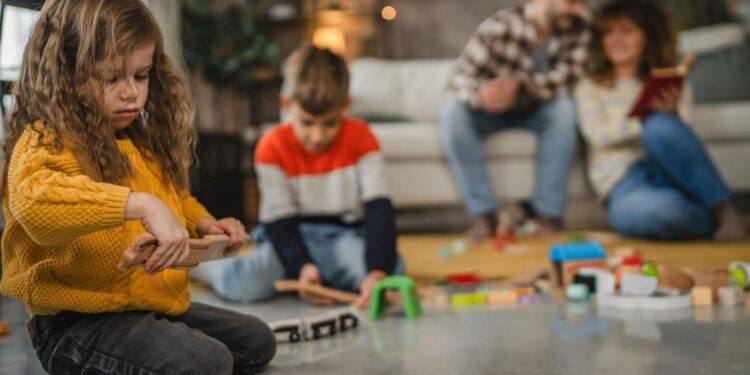Family gatherings and special events can be stressful – especially for your child with autism.
The lack of schedule and predictability, difficulty with communication and social nuances, and sensory overload, are all challenges that can feel too big to tackle at one time. But we – a mom who’s been there and a psychologist who works with kids with autism – are here to tell you that it is possible with some planning and expectation setting.
We’d like to share some tips that have helped our patient families attend events including parties, celebrations, and holiday gatherings.
BEFORE THE EVENT
Your child can feel better prepared if you do some work ahead of time. Some aspects to consider:
- Prepare with pictures.
Kids with autism tend to be visual learners, and studies show that pictures, or “visual supports,” can increase predictability and comprehension. This, in turn, can reduce anxiety about unfamiliar events. Show your child pictures of who will be at the party and what the house or event space looks like. Add the pictures to an album on your phone or computer and flip through them multiple times before the event. - Explain what might happen with social narratives.
Explain what might happen and how others may behave from the beginning to the end of the event. Use photos to help increase understanding. Going over this information as often as possible will help ease some of their anxiety.For example, “We are going to Aunt Judy’s house. There will be about 20 people there. We’ll eat lunch in this room, then sing happy birthday to your cousin, John. He will open gifts, and then we will leave.”
HELPFUL RESOURCES: The Cincinnati Children’s Rubinstein Library at (3430 Burnet Ave, 3rd Floor) offers FREE software that families can use to create visual supports and social narratives. Contact our librarian, Matthew Cooper, for details matthew.cooper@cchmc.org. Carol Gray is another resource for creating visual stories.
- Practice skills ahead of time, such as:
- Calming methods. Whatever calming methods work for your child, practice them at home. A party is not the best time to learn new coping skills.
- Communication skills: If your child is verbal, practice the skills you know they can handle. Maybe it’s saying “hello” when they first meet someone or saying “happy birthday” to the right person.
- Talk to the host or other family members.
Have a conversation with family members ahead of time to manage expectations, as well as to explain what autism looks like for your child. You can cover topics such as:- A safe space. It’s helpful to have a planned safe space for your child to use if they get overwhelmed.
- Early departure. Explain that if your child reaches their limit, you might need to leave early, but it’s in no way a reflection of the host or experience.
- Food. Give the host a heads up that you plan to bring food items that you know your child will eat.
- Behavior differences. Describe any potential behaviors you think your child might exhibit, and how you plan to handle them.
- Communication devices. If your child uses a communication device, it can be helpful for your family to know how to interact with your child and how the device works.
- Known triggers. If there are known triggers, discuss potential modifications the host might be willing to make.
- Assign a safe person.
Identify a familiar family member to help your child if they can’t find you. - Reach out to your child’s therapist.
Lean on your child’s therapist to help you prepare. They have suggestions and supports that can help your family navigate a challenging event.
DURING THE EVENT
See this as an opportunity for learning and growth – try not to compare your family to others. Your child doesn’t have to be doing everything that other kids are doing. Just being there is a win! During the event, try some of the following strategies:
- Structure the unstructured.
Family gatherings often lack a clear schedule and may feel too unstructured to your child. We recommend trying to structure your child’s time as much as possible:- If you created visual supports prior to the event, bring them with you and go over them when you arrive.
- Bring low pressure activities your child already enjoys. They could engage in their own activities in the room with other kids or separately.
- Build in breaks, including a safe space for sensory downtime or going for a walk.
- Bring preferred fidgets, comfort items, and/or noise cancelling headphones. Even if it doesn’t seem loud to us, it can be overwhelming to a child with sensory differences.
- Bring preferred foods. Bringing food items you know your child eats will ensure that they won’t go hungry. It also provides a sense of familiarity.
- Give your child choices whenever possible. This may include choices about where they spend their time, who they sit with, or which activities they participate in.This gives your child a small sense of control in an uncomfortable situation.
- Have an exit strategy. Have a plan for when things don’t go well. Go to the safe space. Go for a walk. Whatever you and your child need to do to reset. And if that doesn’t work, it’s okay to leave! Some families drive two cars, that way other family members can stay at the event.
AFTER THE EVENT
Because predictability and routine are helpful, try to get back to your normal schedule as much as possible after the party.
And most importantly, take time to reflect and celebrate the things that went well! Progress and victories, large and small, are priceless. Maybe your child was able to sit at the table for five minutes or in the heat of the moment, they used their coping strategies. Praise their successes. Take note of what went well and what strategies worked best, and store those away for next time.
Looking to schedule an appointment? Our Kelly O’Leary Center strives to improve the health, quality of life, and outcomes for children and adolescents with autism spectrum disorders. Call 513-636-4611 to schedule an appointment.






































